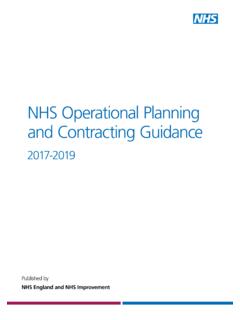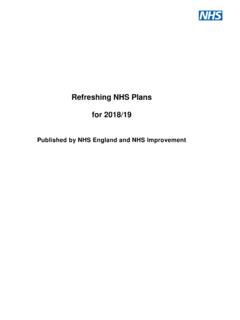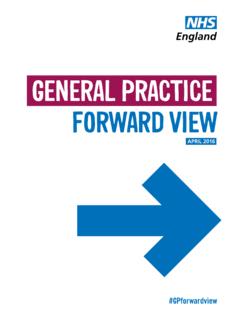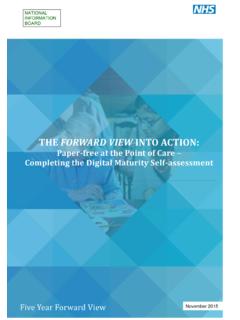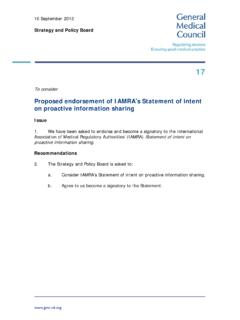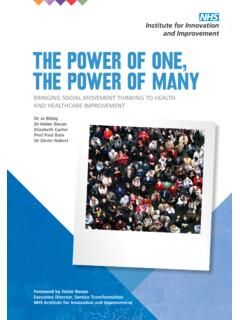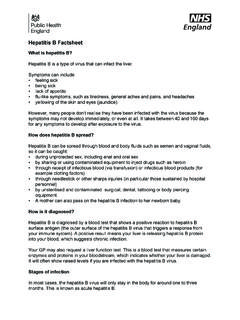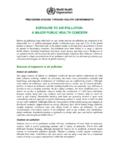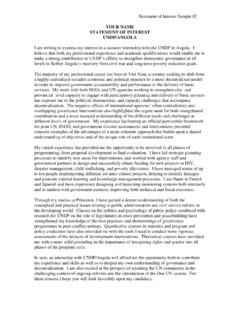Transcription of Report template - NHSI website - NHS England
1 Integrating care Next steps to building strong and effective integrated care systems across England 1 | Contents Contents Introduction .. 2 Purpose .. 4 Putting this into practice .. 9 Legislative proposals .. 27 Implications and next steps .. 33 2 | Introduction Introduction This document builds on previous publications that set out proposals for legislative reform and is primarily focused on the operational direction of travel. It opens up a discussion with the NHS and its partners about how ICSs could be embedded in legislation or guidance.
2 Decisions on legislation will of course then be for Government and Parliament to make. This builds on the route map set out in the NHS Long Term Plan, for health and care joined up locally around people s needs . It signals a renewed ambition for how we can support greater collaboration between partners in health and care systems to help accelerate progress in meeting our most critical health and care challenges. It details how systems and their constituent organisations will accelerate collaborative ways of working in future, considering the key components of an effective integrated care system (ICS) and reflecting what a range of local leaders have told us about their experiences during the past two years, including the immediate and long-term challenges presented by the COVID-19 pandemic.
3 These are significant new steps towards the ambition set out in the NHS Long Term Plan, building on the experience of the earliest ICSs and other areas. Our challenge now is to spread their experience to every part of England . From April 2021 this will require all parts of our health and care system to work together as Integrated Care Systems, involving: Stronger partnerships in local places between the NHS, local government and others with a more central role for primary care in providing joined-up care; Provider organisations being asked to step forward in formal collaborative arrangements that allow them to operate at scale; and Developing strategic commissioning through systems with a focus on population health outcomes.
4 The use of digital and data to drive system working, connect health and care providers, improve outcomes and put the citizen at the heart of their own care. This document also describes options for giving ICSs a firmer footing in legislation likely to take effect from April 2022 (subject to Parliamentary decision). These proposals sit alongside other recommendations aimed at removing legislative barriers to integration across health bodies and with social care, to help deliver better care and outcomes for patients through collaboration, and to join up national leadership more formally.
5 NHS England and NHS Improvement are inviting views 3 | Introduction on these proposed options from all interested individuals and organisations by Friday 8 January 2021. It builds on, and should be read alongside, the commitments and ambitions set out in the NHS Long Term Plan (2019), Breaking Down Barriers to Better Health and Care (2019) and Designing ICSs in England (2019), and our recommendations to Government and Parliament for legislative change (2019). 4 | Purpose 1. Purpose The NHS belongs to us all1 and any changes to it must bring clear improvements for our health and care.
6 Since 2018, integrated care systems (ICSs) have begun doing just this, enabling NHS organisations, local councils, frontline professionals and others to join forces to plan and provide around residents needs as locally as possible. By doing this, they have driven a bottom-up response to the big health and care challenges that we and other countries across the world face and have made a real difference to people s lives. They have improved health, developed better and more seamless services and ensured public resources are used where they can have the greatest impact.
7 These achievements have happened despite persistent complexity and fragmentation. This document describes how we will simplify support to local leaders in systems, making it easier for them to achieve their ambitions. Our proposals are designed to serve four fundamental purposes: improving population health and healthcare; tackling unequal outcomes and access; enhancing productivity and value for money; and helping the NHS to support broader social and economic development. The NHS Long Term Plan set out a widely supported route map to tackle our greatest health challenges, from improving cancer care to transforming mental health, from giving young people a healthy start in life to closing the gaps in health inequalities in communities, and enabling people to look after their own health and wellbeing.
8 The COVID-19 pandemic has given the NHS and its partners their biggest challenge of the past 70 years, shining a light on the most successful approaches to protecting health and treating disease. Vulnerable people need support that is joined up across councils, NHS, care and voluntary organisations; all based on a common understanding of the risks different people face. Similarly, no hospital could rise to the challenge alone, and new pathways have rapidly developed across multiple providers that enable and protect capacity for urgent non-COVID care.
9 This has all been backed up by mutual aid agreements, including with local councils, and shared learning to better understand effective response. It has 1 5 | Purpose required openness in data sharing, commitment to collaboration in the interests of patients and communities, and agile collective decision-making. The significant challenges that face health and care as we recover from the pandemic make it even more important to have strong and thriving systems for the medium term. Important changes were driven by emergency response but must be hard-wired into our future working so that the gains of 2020 can endure.
10 DHSC s Busting Bureaucracy: Empowering frontline staff by reducing excess bureaucracy in the health and care system in England Report , published on 24 November 2020, describes in detail some of these important areas of change. The Report found that there are many sources of excess bureaucracy and that these are often exacerbated by duplicative or disproportionate assurance systems and poorly integrated systems at a national, regional and local level. The Report also acknowledges that the more levels of hierarchy in a system, the more likely it is that bureaucracy will exist and grow.
